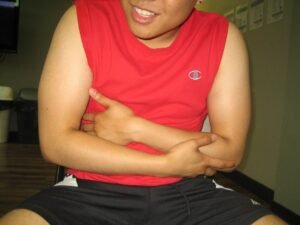Salmonella food poisoning is basically an infection that occurs in the small intestines. This is considered as one of the common types of food poisoning and caused by the Salmonella bacteria group. The bacteria can thrive in the intestines of both humans and animals. An infection develops if an individual eats food that is infected with the animal feces. It commonly occurs during the summer season since the bacteria thrives well during the warm weather.
Causes of salmonella food poisoning
Consumption or drinking food and liquids that are contaminated with the Salmonella bacteria causes food poisoning. Individuals become infected by eating raw foods or those that are prepared by individual who have the bacteria on their hands.
The bacteria is spread if proper hand washing is not observed after using the toilet or handling pets especially birds and reptiles.
Salmonella food poisoning is commonly caused by the following:
- Undercooked eggs
- Undercooked poultry such as chicken or turkey
- Unpasteurized milk or juice
- Contaminated raw vegetables, fruits and nuts
- A pet bird or reptile
- Travelling to developing countries with poor sanitation and hygienic standards
Symptoms of salmonella food poisoning
The symptoms of this food poisoning typically manifest quickly and aggressively lasting up to 48 hours. The common symptoms during the acute phase include:

- Abdominal pain, tenderness or cramping
- Diarrhea
- Chills
- Nausea and vomiting
- Muscle pain
- Bloody stool
- Signs of dehydration
The dehydration caused by diarrhea is a serious issue especially among children and infants. They can become severely dehydrated in a day and can often lead to death.
How salmonella food poisoning is diagnosed?
A physical examination is performed when diagnosing the condition. Your doctor will check if the abdomen is tender or there is a skin rash that appear as small-sized pink dots and accompanied by high fever. A blood test or stool culture can also be requested in order to determine the presence of Salmonella bacteria in the body.
Preventing salmonella poisoning
There are various ways in order to prevent salmonella poisoning.
- Food must be handled properly and cook foods at the recommended temperatures as well as refrigerating leftovers right away.
- Counters in the kitchen must be cleaned before and after the preparation of high-risk foods.
- Always wash hands properly especially poultry and eggs.
- Keeps foods refrigerated before cooking.
- Use separate utensils for cooked and raw items.
- For those who have birds or reptiles as pets, always wear gloves or wash hands after handling them.
Treating salmonella poisoning
As an initial first aid measure for this type of poisoning, fluids and electrolytes must be replaced when there is diarrhea. For adults, you have to provide water or let him/her suck on ice cubes.
For children, the doctor typically recommends rehydration drinks such as Pedialyte. Additionally, there are modifications to the diet that involves eating foods that are easily digestible such as rice, banana, toast and applesauce and try to avoid dairy products. The individual must be allowed to get enough rest.
In case nausea prevents the individual from drinking liquids, it is best to consult your doctor so that intravenous fluids can be given especially to young children.
For healthy individuals, the symptoms can go away within 2-7 days. Nevertheless, the bacteria can stay within the body longer. Take note that the illness can stay in the body for 1-2 weeks. In some individuals, they are still carriers of the bacteria for a year or more after the acute phase.
